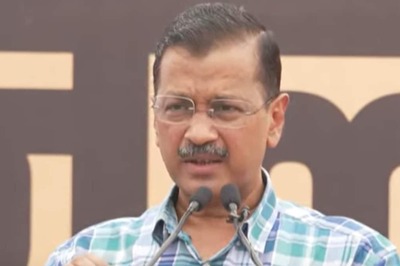
views
After he quit the Congress party a few days ago, Gourav Vallabh told the media that he had opposed the Congress’ criticism and condemnation of the country’s wealth creators. He was referring to the statements regularly made by the party’s senior leaders led by Rahul Gandhi, against the likes of the Ambani and Adani industrial groups. Vallabh was a prominent face of the Congress in television debates, stridently defending the party’s position on various issues.
He told the news agency ANI, “I told all the senior leaders of Congress that we need to stop criticising the wealth creators of the country. Adani and Ambani have been criticised day and night by Congress. I did a press conference against Adani, but when SEBI gave Adani a clean chit, I stopped giving statements about them.”
This constant abuse of India’s industrialists was on Prime Minister Narendra Modi’s mind, when, in his Independence Day address in 2019, he said, “Let us never see wealth creators with suspicion. Only when wealth is created, wealth will be distributed… Wealth creation is absolutely essential, those who create wealth are India’s wealth and we respect them.”
It was not the first time that the prime minister had stepped in to counter the barbs and jibes that Opposition leaders directed against the country’s wealth creators. In 2018, he had remarked that he wasn’t worried or apologetic about being seen with industrialists. Later, that same year, he emphatically rejected the culture of criticising private industry and corporations, adding that they were contributing enormously to the development of India while also undertaking several social responsibilities.
The observations by the prime minister and Gourav Vallabh bring into focus the deeply embedded distrust of, and even dislike for, private enterprise, among the so-called socialist-minded people since the time of independence. This mindset also got mainstreamed through popular cinema and literature as well, where capitalism was projected as an evil word, and where capitalists were depicted as greedy, self-centred and totally bereft of morals and scruples.
An industrialist would be shown as playing billiards, or having drinks, or smoking expensive cigars, while outside on the streets, his workers pleaded for justice in the form of higher pay and benefits. To subdue the righteous workers, the industrialist would summon the services of his musclemen, who would break their bones. The wealth creator was, thus, placed in the popular imagination as no less than a villain and a rogue—even as one going against the national good. It came as no surprise that many filmmakers and writers who presented this image of a wealth creator were from the Leftist stock or had an inclination towards the communist economic ideology.
Such a flawed perception was disrupted with the economic reforms initiated by Prime Minister PV Narasimha Rao in 1991, which sought to give private industry the respect it deserved and wealth creators the stature they ought to have got long before. Yet, as recent comments by leaders of the Congress party demonstrate, vestiges of the old thinking still remain.
One reason, in fact, the primary reason, for the mainstreaming of private enterprise as being socially undesirable emanated from the outlook of our political leaders since the time of independence, beginning from Jawaharlal Nehru. This is ironic since Nehru was a modernist who believed that the road to India’s progress lay in rapid industrialisation. Yet, he was deeply suspicious of private industry and, therefore, chose the path of public sector industrialisation. His decision only contributed to the general belief that the private industrialist, driven by self-sustainment, could not be trusted with the greater, national good. It’s a different matter that many of the public sector behemoths would turn out to be loss-making enterprises, thanks to government interference and regressive rules.
Nehru’s legacy was taken forward by his successors, all of whom did everything within their command to stifle wealth creators. In fact, compared to the stranglehold they proceeded to have on private wealth creators, Nehru’s reign looked in retrospect as comparatively benign. Indira Gandhi added to the woes of national wealth creators through a slew of suffocating rules and regulations. If the private sector and the wealth creators still survived, and even grew (albeit slowly), it was entirely due to their own resilience. Multiple laws and rules were thrown at the private sector, all in a bid to ensure that wealth creators were hampered.
Noted industrialist JRD Tata was compelled to pen to Indira Gandhi a stinging letter on the situation. In May 1972, he wrote on the ‘disturbing decline’ in industrial growth and pointed out that there was no “simple and universal remedy.” He also gave his suggestions and added that, given the prevalent environment, advice from an “industrialist may not be politically acceptable” to the government.
Although Indira Gandhi maintained a blow-hot-blow-cold relationship with the Left, her economic policies were decidedly and consistently Leftist. She nationalised more than half a dozen of the biggest banks, and also the coal, steel, copper, refining, cotton textiles, and insurance industries—thus sending across a message to the people that private wealth creators could not be trusted in the task of nation-building. It was in this backdrop that Tata’s communication reached her. Her successor, Rajiv Gandhi, although a modernist like Nehru, did little to offer relief. On the contrary, his finance Minister VP Singh, who had a pathological dislike for private wealth creators, acted with a vengeance against some of the most respected titans of private industry, hauling them up like petty criminals.
It appears that the Congress party of today, helmed de facto by Rahul Gandhi, is yet again in the grip of Leftist thought, and is determined to re-paint the private industry and its wealth creators with the old brush. Gourav Vallabh is not the only one to feel uncomfortable; there would be many others in the party who must be writhing.
Once, such an approach resonated with the people. But times have changed, and the wealth creator, as Prime Minister Modi pointed out, is seen as a figure of respect—one who generates wealth, helps in its distribution, provides employment, and engages in corporate social responsibilities. 65 per cent of the country’s population comprises those who are under 35 years of age, and 50 per cent of those that are under 25 years. They are aspirational and do not view wealth creation with disdain. The Congress party appears to have a serious disconnect with those aspirations.
Author Idowu Koyenikan once said: “When you work on something that only has the capacity to make you five dollars, it does not matter how much harder you work – the most you will make is five dollars.”
The wealth creator is an inspiration, not a subject of criticism, for the millions who are on the lookout for capacities that will free them from the five-dollar limit.
The writer is an author and a public affairs analyst. Views expressed in the above piece are personal and solely that of the author. They do not necessarily reflect News18’s views.




















Comments
0 comment